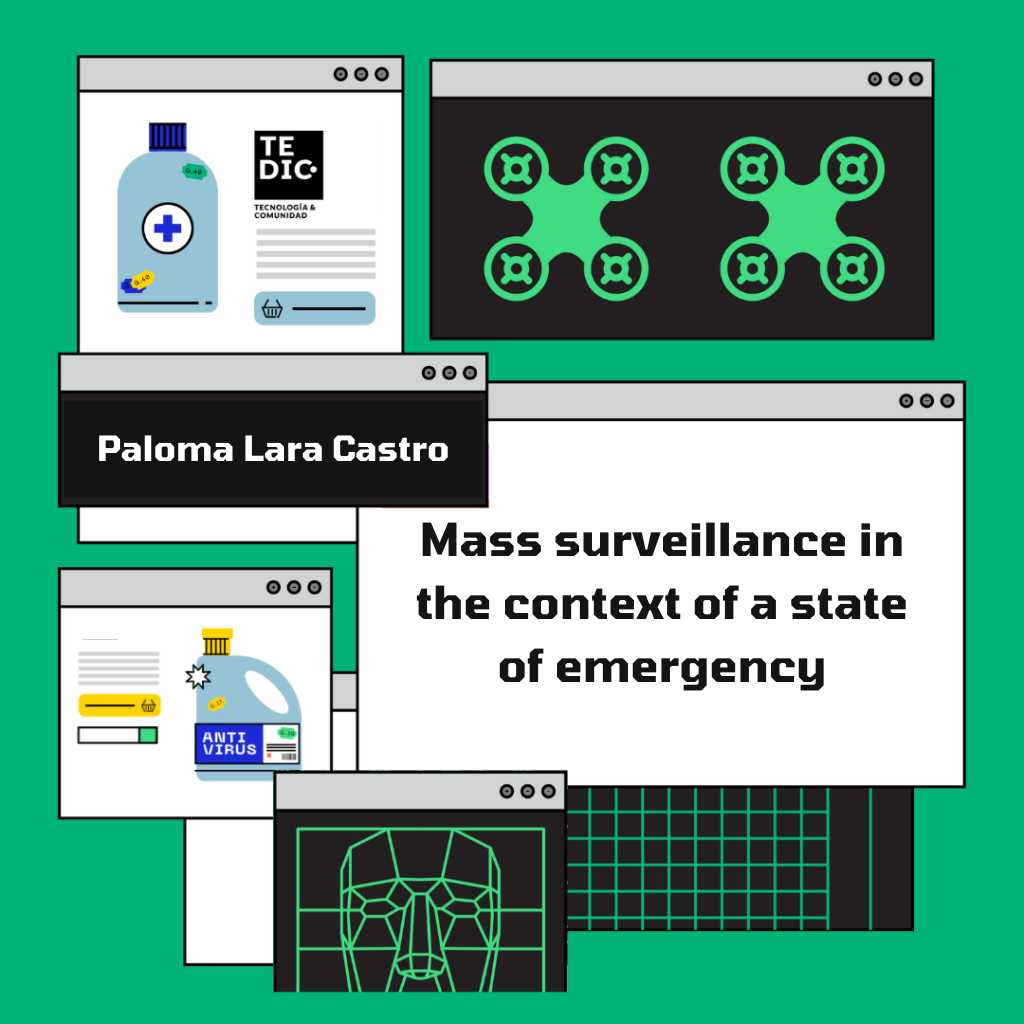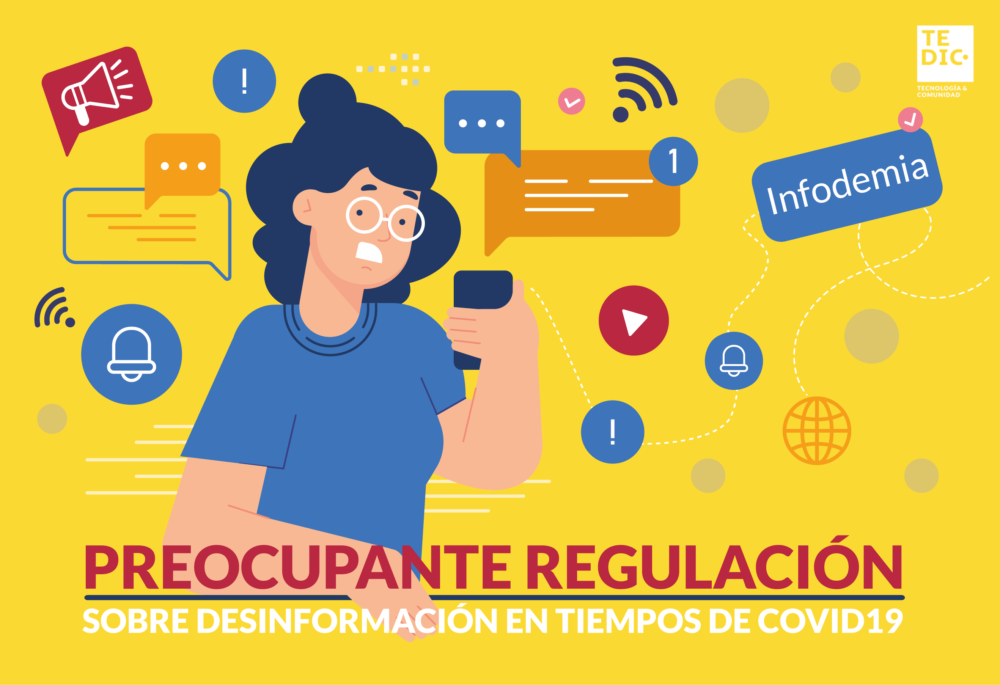
This article was originally published in The GNI Blog and is the result of a fellowship conducted by a member of TEDIC with GNI-Internews.
This article extracts some sections from the EPU report delivered to United Nations in October 2020. For more information, access here.
In the context of my GNI-Internews Fellowship, I conducted research to determine whether gray areas of Paraguayan law in times of crisis could enable the government to implement wide-reaching surveillance and control mechanisms, and if so, what consequences this might have. The research looked at the experience of Paraguay’s dictatorship regime (1954–1989) in order in order to identify common practices of state logic where it uses technology for surveillance purposes using emergency laws. Specifically, I looked into these historical parallels in order to understand how greater acquisition and implementation of technology during the latter period is being justified and what impacts it might have.
From this work, it was possible to conclude that the Paraguayan state has historically used surveillance as a mechanism of citizen control without taking into account international human rights norms, and that this pattern has intensified during the pandemic. These mechanisms have been implemented under a discourse of supposed temporality, but, as has been seen in the democratic transition, it is possible that the increase in the use of technologies without a human rights framework will continue after the COVID-19 period.
Historical Context: Common Practices
Paraguay had a 35-year dictatorship, the longest in Latin America. During this time, the state used surveillance as a mechanism to maintain the status quo. [1] For example, communications were systematically and illegally intercepted by the state, which registered a large amount of sensitive information in intelligence agency databases. An example of this is the Police database, discovered in 1992, now called the “Terror Archive.” [2]
The Truth and Justice Commission estimates that there were a total of 20,090 direct victims of human rights violations and 107,987 indirect victims. [3] The continued violation of human rights was made possible by the use of the legal order as an instrument of domination. [4]
The strategy employed by the regime was to make use of the figure of “state of exception” on a permanent basis. This generally implied that the measure legitimized and protected the arbitrariness of the executive branch. Thus, the guarantees contained in the habeas corpus were suppressed, the control capacity of the legislative branch of power was limited, laws contemplating “ideological crimes” were approved, and dissidents of the regime were systematically persecuted. [5]
The Use of Technology in the Context of COVID-19
Paraguay is one of many countries that have put in place new measures, legal and technological, to help contain the spread of the Coronavirus. Unprecedented levels of surveillance, data exploitation, and misinformation are being tested across the world. It is important to examine how these technological solutions will impact democracy at the global level, both during this emergency period and moving forward.
In Paraguay, many proposals and ideas emerged on how to use technology to face the COVID-19 pandemic, some focused on biomedical and social control. While the application of technology can reinforce pre-established public health policies, it is of concern that it is used for mass surveillance purposes. As will be explained later, the technology used in this context was implemented from a technologically revolutionary perspective where no human rights impact study was conducted and no structural changes were aimed, but rather the technology was presented as a sort of magic potion. It is so that these “solutions” are gathering a significant amount of sensitive information, such as health diagnostics and geolocation, among others, and may impose severe restrictions on people’s freedoms, including their privacy and other human rights.
Many of these measures are based on extraordinary powers. Like in many countries, the duration of the declaration of emergency [6] in Paraguay have not been time bound (i.e., there are no sunset clauses). Other countries use existing exemptions in data protection laws to share data. Some may be effective and based on advice from epidemiologists, others will not be. But all of them must be temporary, necessary, and proportionate. Here we outline various measures taken by the government of Paraguay which require further scrutiny and accountability:
Drones in Times of Health Emergency
The Ministry of the Interior expressed the intention to use drones for surveillance in public spaces to enforce compliance with mandatory quarantine in times of pandemic. [7] In 2019, it had already acquired an unmanned vehicle capable of carrying a semi-automatic launcher of non-lethal projectiles (rubber bullets).[8] Juan Ernesto Villamayor, Minister of the Interior at the time, pointed out that the objective of that tender was to use the drone in demonstrations, evictions of buildings, raids, and sporting events. [9] Beyond the statements of the current Minister of the Interior Euclides Acevedo, there is no further information on the use of the drones. In fact, in response to a request for information on the subject, the Ministry responded that “it has not carried out or initiated processes for the acquisition of drones pre-pandemic or during the pandemic,” [10] which contradicts the bidding mentioned in the previous paragraph.
The surveillance referred to by Villamayor had the limitation of spaces or events, that is, citizens would be observed within a certain space and time, for example a soccer match. Therefore, when they left the game, they would not be observed on their way home or at the stops they decided to make. However, in surveillance in the context of a pandemic, there would be no limits, as non-compliance with health regulations could occur anywhere, not linked to a specific location. Non-compliance could occur by walking in the street, or visiting a friend, or playing a group sport. This means that to ensure compliance with the isolation, constant surveillance would have to be carried out throughout the territory.
There must be guarantees that such exceptional uses will be limited to the emergency we face and terminated as soon as they are no longer necessary, and these uses must be accompanied by access to accessible accountability procedures. These safeguards are key to avoiding disproportionate impacts, including possible discrimination against the most vulnerable groups, stigmatization of people affected by COVID-19, and impacts on mental health.
Social Media Monitoring and Surveillance of Peaceful Demonstrations
The Cybercrime Prosecutor’s Office charged a person for the alleged threat of infecting others with COVID-19. The event took place on the social network Twitter, when the person published the following sentence: “We will send you the virus by delivery.” [11]Furthermore, measures deployed to tackle the pandemic such as the obligation to use face masks ended up interfering with other fundamental rights and freedoms such as the right to freedom of peaceful assembly and to freedom of association.
That is the case of the Prosecutor’s Office that charged demonstrators who were peacefully protesting the murder of two girls at the hands of the Fuerzas de Tareas Conjuntas (FTC), a unit of the Paraguayan armed forces. [12] The alleged cause of the accusations was the lack of face masks. [13] They also used photographs published on social networks to identify and accuse people who were participating in a public demonstration against the government, basing the accusations on the damage inflicted to a National Monument, which had been painted over. [14]
Risks for Health Data Protection
As the COVID-19 pandemic unleashed a general fear in the population, there have been cases of harassment of people who suffered the disease. Sensitive health information was leaked by people who were part of the information chain of the public and private health system, resulting in public persecution of patients. [15]
The Ministry of Information and Communication Technology developed a mobile application for the registration of people with COVID-19, as well as the monitoring of symptoms. According to the Ministry of Health, 5,473 people downloaded the app, [16] while only people who are tested positive for the disease are registered in the system. To date, it is not possible to access the privacy and data policies of the application, nor is it planned to allow the data subject rights to access, rectify, cancel, and object in relations to one’s profile once the critical stage of the pandemic has ended.
Ñandareko and Pytyvo Social Assistance Systems
The state systems for economic aid and food kits for vulnerable groups in times of pandemic, called Ñandareko and Pytyvo, had several vulnerabilities in their implementation, resulting in the violation of sensitive information of the beneficiaries. Databases of individuals were leaked, and there were cases where third parties posing as beneficiaries had access to financial resources. [17] These databases are hosted on servers of private companies and their web pages do not respect minimum security criteria, such as https.
There are concerns that these databases could be used for political purposes, since there is no control or transparency in the collection of information. This was the case of an amateur soccer team that signed up for a tournament then appeared on a roster for a Partido Colorado pro-presidential reelection campaign. [18]
Final Considerations: Recommendations
Given that the use of technology for surveillance purposes has been a historically sustained practice, we recommend that the state adopt an adequate regulatory framework in line with internationally recognized principles and standards in order to guarantee the transparency and accountability in the acquisition of surveillance technology. In this specific context, we believe it is important to emphasize that the state must ensure that any extraordinary measures adopted to respond and tackle COVID-19 are in line with human rights law and standards, are temporary and as a result their implementation should be limited in time to the pandemic, and that public health is not used as a justification to undermine and curtail disproportionally fundamental rights and freedoms.
[1] “Eyes that Don’t Blink: The State of Surveillance in Latin America:” https://www.eff.org/es/deeplinks/2016/10/ojos-que-no-parpadean-america-latina
[2] “State surveillance of communications and fundamental rights in Paraguay:” https://www.tedic.org/wp-content/uploads/2018/12/Vigilancia-estatal-de-las-comunicaciones-y-derechos-fundamentales-en-Paraguay.pdf
[3] Truth and Justice Commission report: http://www.derechoshumanos.net/lesahumanidad/informes/paraguay/Informe_Comision_Verdad_y_Justicia_Paraguay_Conclusiones_y_Recomendaciones.pdf
[5] “Truth and Justice Commission Report”: http://www.derechoshumanos.net/lesahumanidad/informes/paraguay/Informe_Comision_Verdad_y_Justicia_Paraguay_Conclusiones_y_Recomendaciones.pdf
[6] “National Emergency Decree:” https://www.mspbs.gov.py/dependencias/portal/adjunto/aa556a-DECRETO3456DE2020EMERGENCIANACIONAL.pdf
[7] “Government wants to control quarantine compliance with cell phones apps and drones:” https://www.ultimahora.com/gobierno-quiere-controlar-cumplimiento-cuarentena-aplicacion-celulares-y-drones-n2876609.html
[8] Public Procurement — Ministry of the Interior — UAV Drones https://www.contrataciones.gov.py/licitaciones/adjudicacion/368495-adquisicion-vehiculo-aereo-no-tripulado-uav-dron-lanzador-semiautomatico-proyectiles-1/resumen-adjudicacion.html Public Procurement — Ministry of the Interior — Drones https://www.contrataciones.gov.py/licitaciones/adjudicacion/357568-adquisicion-equipos-antidisturbios-chalecos-antibalas-drones-1/resumen-adjudicacion.html
[9] Drone use: does it combat the pandemic or strengthen surveillance? https://www.tedic.org/en/drone-use-does-it-combat-the-pandemic-or-strengthen-surveillance/
[10] Memorandum number 336/2020 issued in response to the request for information sent
[11] “Charged woman who spoke of ‘sending the virus by delivery’ on Twitter:” https://www.abc.com.py/nacionales/2020/03/31/mujer-que-amenazo-con-contagiar-covid-19-se-expone-a-pena-de-tres-anos/
[12] “They Were Girls — Double Infanticide in Paraguay.” P.12, Argentina https://www.pagina12.com.ar/291213-eran-ninas-el-doble-infanticidio-en-paraguay
[13] The partiality of the prosecution leads to dangerous stronist practices https://www.ultimahora.com/la-parcialidad-la-fiscalia-lleva-peligrosas-practicas-stronistas-n2905243.html
[14] “More accused for actions in front of pantheon and ask to have more prosecutors.” Última Hora: https://www.ultimahora.com/mas-imputados-actos-frente-al-panteon-y-piden-tener-mas-fiscales-n2905031.html
[15] “Family of COVID19 patient receives threats.” Available at https://www.ultimahora.com/familia-paciente-covid-19-recibe-amenazas-n2875197.html
[16] TEDIC consultation to the MSPyBs on July 30, 2020. Gender: F. 2484 M. 2989.
[17] “Investigation into who leaked the Pytyvo database.” June 2020. https://www.ultimahora.com/pytyvo-policia-descarta-hackeo-e-investiga-quienes-filtraron-datos-beneficiarios-n2888246.html
[18] More and more adulterations. Abc Color. January. 2017. https://www.abc.com.py/nacionales/mas-y-mas-adulteraciones-1558716.html

 Worrisome regulation on disinformation in times of COVID19
Worrisome regulation on disinformation in times of COVID19